From the Chicago Reader (February 1, 1991). — J.R.
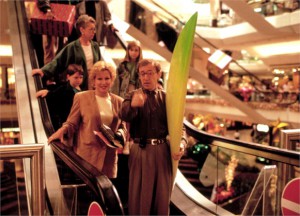
A middle-aged couple (Woody Allen and Bette Midler) in southern California celebrating their 15th anniversary go to a shopping mall, and they proceed to decompose and recompose their relationship on the basis of various revelations. Although this only runs for about 90 minutes, it’s the emptiest and most long-winded movie Paul Mazursky (working here with his frequent cowriter Roger L. Simon) has ever made, a disappointingly steep descent after his Enemies, a Love Story. The characters never come to life, and restricting almost all of the action to a gigantic mall only makes the narrowness and boredom of the movie more obvious. Mazursky has returned with a vengeance to his special universe where the upper middle class is the only thing that exists, and this time he has absolutely nothing to say about it. (JR)
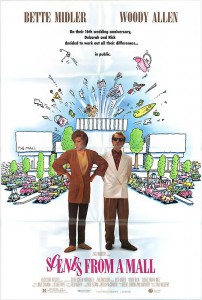 Read more
Read more
From the Chicago Reader (January 7, 1994). — J.R.
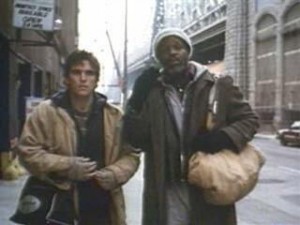
It would appear that many of my colleagues have been trashing this powerful and moving look at friendship among the homeless in New York — directed by Tim Hunter (River’s Edge) from a script by Lyle Kessler (Orphans) and starring Danny Glover and Matt Dillon at their rare best — simply because of its subject matter and authenticity; apparently, contemporary man-made tragedies are inappropriate topics for the big screen, unlike ghosts, dinosaurs, mythical serial killers, and former holocausts. But if epic grandeur is what you’re looking for, this movie gives you glimpses of the Fort Washington Armory, which currently shelters 700 people nightly, that recall the famous shot of the Confederate wounded in Gone With the Wind, and if noir finality is your meat, this movie tells you things about New York’s potter’s field that easily might have found their way into Pickup on South Street. This isn’t a perfect movie, and it may occasionally err on the side of Dickensian sentiment, but I it has so much to say about the world we live in and says it with such grace, wit, and raw feeling that I recommend it without qualification. Read more
From the Chicago Reader (September 1, 2001). — J.R.
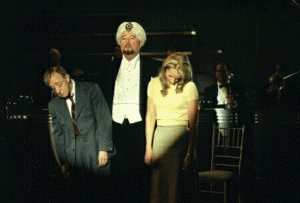
As a rule, my favorite Woody Allen films are those select few that (a) warmly acknowledge Allen’s working-class roots, (b) steer clear of European influences, and (c) seek mainly to entertain. Manhattan Murder Mystery did the latter two wonderfully, and Broadway Danny Rose did all three, as does this charming throwaway, set in 1940. One thing I especially like about it, apart from the flavorsome 40s decor in color, is that it’s silly in much the same way that many small 40s comedies were. Allen is an insurance investigator and Helen Hunt an efficiency expert working for the same company; they hate each other with a passion — until they’re hypnotized during a nightclub act into not only loving each other madly but also stealing jewels whenever posthypnotic suggestions are delivered. Others in the cast include Dan Aykroyd, Elizabeth Berkley, Brian Markinson, Wallace Shawn, David Ogden Stiers, and Charlize Theron. 104 min. (JR)
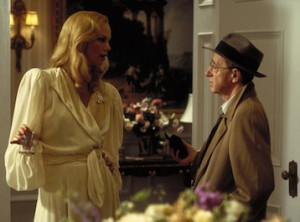 Read more
Read more
From the Chicago Reader (October 17, 1997). — J.R.
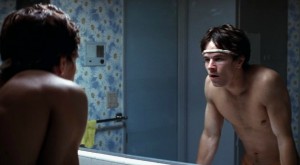
Writer-director Paul Thomas Anderson’s second feature (after Hard Eight) is a two-and-a-half-hour epic about one corner of the LA porn industry during the 70s and 80s — a seemingly limited subject that becomes the basis for a suggestive and highly energetic fresco. The sweeping first hour positively leaps with swagger and euphoria as an Orange County busboy (Mark Wahlberg) is plucked from obscurity by a patriarchal pornmeister (Burt Reynolds at his near best) to become a sex star. Alas, this being the American cinema, tons of gratuitous retribution eventually come crashing down on practically everybody in mechanical crosscutting patterns, and because Anderson has bitten off more than he can possibly chew, a lot of his minor characters are never developed properly. Moreover, just as Hard Eight at times slavishly depended on Jean-Pierre Melville’s Bob le flambeur, Anderson’s idea of a smart move here is to “outdo” Tarantino (in a fabulous late sequence with Alfred Molina) and to plagiarize a sequence from Raging Bull that itself quotes from On the Waterfront, rather than come up with something original. But notwithstanding its occasional grotesque nods to postmodernist convention, this is highly entertaining Hollywood filmmaking, full of spark and vigor. Read more






